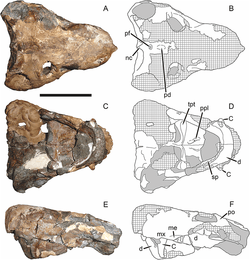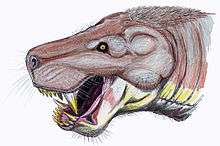Clelandina
| Clelandina Temporal range: Late Permian 259–254 Ma | |
|---|---|
 | |
| Holotype skull of C. rubidgei | |
| Scientific classification | |
| Kingdom: | Animalia |
| Phylum: | Chordata |
| Order: | Therapsida |
| Family: | †Gorgonopsidae |
| Tribe: | †Rubidgeini |
| Genus: | †Clelandina |
| Type species | |
| Clelandina rubidgei Robert Broom, 1948 | |
| Synonyms | |
| |


Clelandina is an extinct genus of rubidgeine gorgonopsian from the Late Permian of Africa. It was first named by Broom in 1948. The type and only species is C. rubidgei. It is relatively rare, with only four known specimens.[1][2]
Description
Clelandina rubidgei has an extraordinarily small sclerotic ring relative to the size of its orbit, which implies that it was diurnal. It is the only rubidgeine with a preserved sclerotic ring, so it is unknown whether this trait was shared by other members of the subfamily. Like all rubidgeines, it was relatively large, with a skull up to 36 cm long. It had reduced dentition, with the teeth posterior to the canines being absent and replaced with a bony ridge. The skull has heavily pachyostosed, with massive rugose bosses.[1]
Classification
Clelandina shares many characteristics with Rubidgea and Dinogorgon, which has led some authors to synonymize them. All three are now considered to be part of the same tribe, Rubidgeini, rather than the same genus.
Below is a cladogram by Kammerer et al. in 2016.[1]
| Rubidgeinae |
| ||||||||||||||||||||||||||||||||||||||||||||||||
| |
See also
References
- 1 2 3 Kammerer, Christian F. (2016). "Systematics of the Rubidgeinae (Therapsida: Gorgonopsia)". PeerJ. 4: e1608. doi:10.7717/peerj.1608.
- ↑ "Fossilworks: Clelandina".
Further reading
- paleodb.org
- www.paleofile.com Alphabetical list - C section.
- The Origin and Evolution of Mammals by Tom Kemp. Published 2005, Oxford University Press. ISBN 0-19-850761-5
